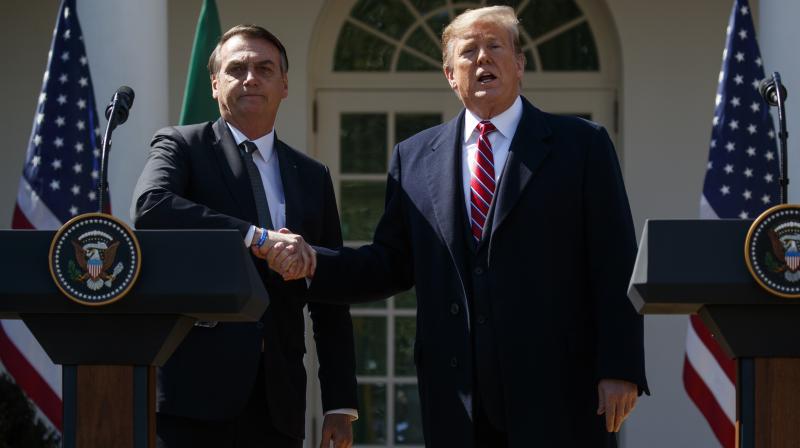Trump attacks Facebook, Google, Twitter, says they are politically biased

Washington: President Donald Trump stepped up claims of political bias by Big Tech firms Tuesday in a fresh assault on Silicon Valley after one of his key congressional allies sued Twitter claiming it discriminates against conservatives.
The latest diatribe from the president comes with online platforms facing heightened scrutiny on how they filter and amplify content -- but with the industry fiercely defending itself against claims of political bias.
Trump renewed his attacks after retweeting news of a lawsuit filed by Republican Representative Devin Nunes seeking USD 250 million in damages from Twitter.
"Facebook, Google and Twitter, not to mention the Corrupt Media, are sooo on the side of the Radical Left Democrats," Trump tweeted.
Hours later, he went further when asked about social media at a joint press briefing with his Brazilian counterpart Jair Bolsonaro.
"It seems to be if they are conservative, if they are Republicans, in a certain group, there is discrimination. I see it on Twitter and Facebook," Trump said.
In a separate tweet, the president pointed to an incident in which his social media director Dan Scavino was temporarily blocked on Facebook.
Facebook, Google and Twitter, not to mention the Corrupt Media, are sooo on the side of the Radical Left Democrats. But fear not, we will win anyway, just like we did before! #MAGA
— Donald J. Trump (@realDonaldTrump) March 19, 2019
"I will be looking into this!" Trump wrote, adding the hashtag #StopTheBias.
Facebook said Scavino, who claimed he was merely responding to comments, was briefly blocked as a result of activity detected as spam, not for any political reason, and added that it had apologized to him.
Nunes alleged in his lawsuit filed in a Virginia state court that Twitter "shadow bans" conservatives, making their messages less visible.
The Fake News Media has NEVER been more Dishonest or Corrupt than it is right now. There has never been a time like this in American History. Very exciting but also, very sad! Fake News is the absolute Enemy of the People and our Country itself!
— Donald J. Trump (@realDonaldTrump) March 19, 2019
He also claimed Twitter was negligent for failing to crack down on parody accounts such as "Devin Nunes' Mom" and "Devin Nunes' cow" which accused him of obstructing investigations into the president.
Nunes, the former Republican leader of the House probe into Russian interference in the US election, stepped aside in 2017 after being criticized for compromising the probe in visits to the White House.
Nunes, then the chairman of the House Intelligence Committee, had sought to turn the investigation away from Russia and toward allegations that the previous Obama administration abused its powers by spying on Trump and his advisors.
Rancor over Nunes sharing top secret intelligence reports with Trump -- but not members of his own committee -- had driven the committee's probe to a halt.
The suit echoes accusations from Trump that major internet platforms discriminate against conservatives, even though he himself has more than 59 million followers on Twitter.
Twitter declined to comment on the lawsuit, but has in the past vigorously denied claims that its platform is politically biased.
Legal analysts have largely maintained that internet platforms such as Twitter are not liable for most content posted by third parties, but the Nunes lawsuit claims Twitter was negligent and failed to enforce its own terms of service.
"Twitter let it happen because Twitter had (and has) a political agenda and motive," the lawsuit said.
The complaint included many of the insulting tweets, including one from the Devin Nunes' Mom account stating: "Are you trying to obstruct a federal investigation again? You come home right this instant or no more Minecraft!"
Other tweets accused the lawmaker of having white supremacist friends and distributing "disturbing inflammatory racial propaganda."
Separately, the president's son Donald Trump Jr. wrote in the news outlet The Hill that tech firms are using a variety of tools to silence conservatives.
"Facebook appears to have deliberately tailored its algorithm to recognize the syntax and style popular among conservatives in order to 'deboost' that content," he wrote.
Internet firms have consistently maintained there is no attempt to impose bias on their platforms and that conservative have large followings on social platforms.
"Tech firms do not, and it would be foolish for them to make conscious decisions to discriminate on political grounds," said Ed Black, head of the Computer & Communications Industry Association, which represents major firms including Facebook and Google.
Black called the recent attacks an effort "to bully them into an attempt to do it in a direction favorable to the attackers."

